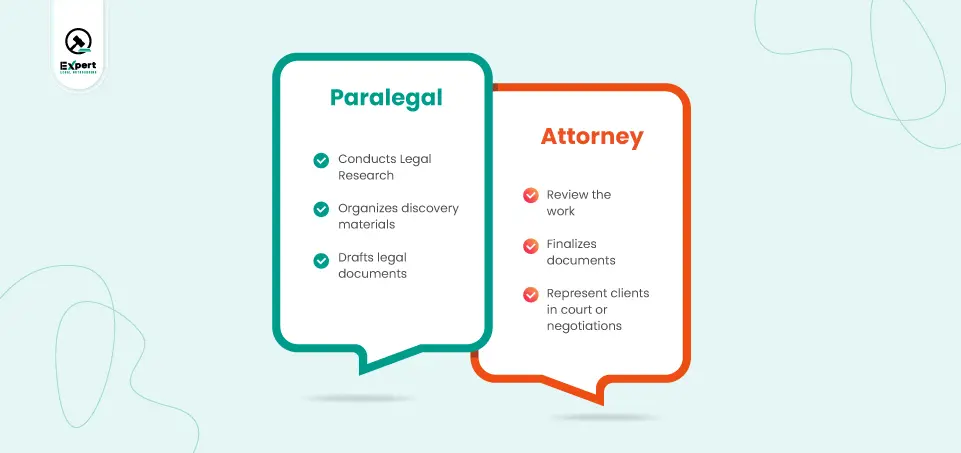Today, we are here to clear out 2 common myths you might have heard.
Myth1: An attorney is someone who has passed the bar exam and can therefore represent you in court. A lawyer can give you legal advice, but has not passed the bar exam and therefore cannot represent you in court.
Myth2: A lawyer has graduated from law school, but has not passed the bar exam.
So, according to ABA (American Bar Association), a lawyer and an attorney are the same thing. The two words are interchangeable.
Second of all, it is illegal for someone to give you legal advice if they haven’t passed the bar exam or have a license to practice. Note this down, Unlicensed Practice of Law is a 3rd degree felony in Florida, United States.
And just like these myths, we will talk in detail on Lawyer vs Attorney vs Paralegal. Further into the blog, we will also talk about how having a virtual legal assistant is a cost-efficient strategy firms are preferring these days.
Lawyer vs Attorney vs Paralegal
As mentioned above, a lawyer and an attorney are one in the same. They are licensed legal professionals who can give you legal advice and represent others in legal matters. Keep in mind, they have to be a licensed legal professional.
Meanwhile a paralegal is a type of legal assistant that needs to work under attorney supervision, a helping hand with many tasks related to legal cases. Their role stands more supportive, handling research, drafting documents, and managing case files to help attorneys down the road.
A Lawyer Versus A Paralegal
A paralegal’s action is limited, they can do so much under the supervision of a licensed attorney.
A lawyer and a paralegal are both legal professionals but they hold significant differences that one should know before hiring either a lawyer or a paralegal.
| The Ability To Practice Law | We will talk about this in detail later in this post. |
| Tasks and Responsibilities | Lawyers are said to shoulder a greater deal of legal work. That is because at the end of the day, a paralegal’s work is checked by their supervising attorney. |
| Salary and Compensation | A lawyer requires more educational hurdles, thus they have a higher potential return on investment. |
| Qualification | We will be talked about in detail later in this post. |
Can Paralegals Become A Lawyer?
So besides the question “can paralegals work from home?”
The question that many beginners come to ask is “Can a paralegal become a lawyer?”
Despite the experience a paralegal gains from working with a paralegal, they need to sit for the bar exam and complete the same education and licensing requirements to become a lawyer.
So, yes, they can become a lawyer but after they have completed the necessary prerequisites to practice law.
Paralegal vs Attorney | Defining The Roles
A paralegal’s primary role is to support attorneys in preparing for hearings, trails, and other legal proceedings. This includes conducting legal research, drafting documents, and organizing case files. To save a law firm time and money, hiring a virtual paralegal could get the same tasks done but at a lower cost without compromising the quality of work.
Being skilled in many parts of legal work, doesn’t make paralegals eligible to provide legal advice or represent clients in court.
Why? Well, it is proscribed in law that a legal professional without the right education and license cannot give someone else legal advice or represent them in court.
This is the reason attorneys go through extensive education and training. This includes earning a law degree and passing a state bar exam. This is only when an attorney qualifies to practice law. The same goes for a virtual attorney.
More Aspects that Makes A Paralegal Different From An Attorney
| PARALEGAL | ATTORNEY | |
| Differences in Responsibilities | Assist with legal research and document preparation.CANNOT appear in court or give legal counsel.Assists in gathering facts, organizing material, ensuring the attorney has the necessary resources to build a strong caseCharge lower hourly rates | Can represent you in court.Negotiate on their behalf.Provide Legal AdviceTakes the lead in developing strategies, analyzing case law, Charge higher hourly rates |
| Both are involved in preparing legal documents and conducting research. | ||
| Education and Licensing Requirements | Associate Degree to A Bachelor’s Degree in Legal Studies.In some states, it is not mandatory for a paralegal to attend law school. | It is mandatory they complete law school and earn Juris Doctor degree.Must pass the Bar exam in their jurisdiction to be licensed to practice law.They also might be required to continue their education to maintain their license. |
| Legal Authority and Responsibilities | No legal authority to provide legal advice or represent clientsHighly knowledge regarding legal procedures and assist in case preparationWork closely supervised by attorneys | Full legal authority to advise clients, draft legal documents, and represent clients in court.Responsible for making legal decisions, interpreting laws, and ensuring that legal strategies are properly executed. Carry ethical responsibility for all legal work done on behalf of clients. |
Paralegals and Attorneys | The Power Couple
Paralegals and Attorneys are known to work collaboratively to handle legal cases efficiently. Whether remotely or in-house, if they are not a team, then everything will fall apart.

While attorneys focus on the complex legal strategies, client representation, and courtroom litigation, paralegal aid with important administrative and preparatory tasks.
This allows attorneys to focus on clients and case strategy while paralegals take care of the behind the scene actions which helps the case run smoothly.
Furthermore, we have also talked about if paralegals can solicit potential clients for attorneys on another blog.
Why Both Roles are Vital?
Imagine this, the queen bee is the attorney while the worker bees are the paralegals. The attorney/lawyer takes on the central responsibility: advising clients, representing them in court, and making certain the legal strategy is sound.
Meanwhile, paralegals are the supporting staff helping attorneys, our star actors, with essential preparatory work that allows them to focus on the complexities of legal representation.
Together these roles form the cornerstone of law firms, legal departments, and court systems. Without their teamwork, legal services wouldn’t function as efficiently or effectively as they do.
Let’s Talk Paralegal
The role of a paralegal should not be underestimated because they work behind the scenes, on the other hand, it’s the complete opposite. They play a significant role in the output quality of the legal service the attorney provides.
Just because they cannot provide legal advice does not dismiss the significance of their role. They handle research, drafting documents, and manage case files to support attorneys preparing for litigation or legal consultations.
Education and Training Requirements of a Paralegal versus A Lawyer
| A Paralegal | Some states require paralegals to be certified and complete continuing legal education (CLE) training hours. Check state requirements!> Associate’s or Bachelor’s degree in paralegal studies, criminal justice, or a similar field.> Paralegal-specific training and certification: NALA (National Association of Legal Assistants of Legal Assistants) and the National Federation of Paralegal Association (NFPA) |
| A Lawyer | > A four-year bachelor’s degree or equivalent (Prerequisite to be admitted to an ABA-accredited law school)> Graduate from Law School (3 Years at an ABA-accredited law school)> Pass a State Bar Exam> Pass Your Jurisdiction’s Character and Fitness Evaluation> Take an attorney’s oath> Be granted a license |
How Are The Three Musketeers Different?
Education and Licensing
- Lawyers and Attorneys alike are legal professionals who have completed law school, passed the bar exam and hold a license to practice law.
- Paralegals do not attend law school nor sit for the bar exam. They complete a paralegal studies program and may hold certification.
Responsibilities
- Attorneys and Lawyers draft legal documents, advise clients, and represent them in court.
- Paralegals are legal assistants of attorneys. They help by conducting legal research, sorting case files, and preparing legal documents. They use legal case management software to efficiently work through managing case files.
Client Interaction
- Attorneys are the front-office team who work directly with clients, offering legal advice and representing them in legal matters.
- On the other hand, paralegals only interact with clients in the presence of an attorney, handling administrative tasks and preliminary communications.
Collaboration Between Paralegals, Lawyers, and Attorneys

This collaboration between attorneys and paralegals creates a smooth balance which works efficiently for law firms.
The attorneys take care of developing the legal strategies and represent clients. Meanwhile, the paralegals ensure that all necessary documents are ready and sorted and that deadlines are being met.
If the collaboration is done right, attorneys get to focus on the complexity of legal representation and the paralegals take care of the administrative and supportive tasks.
Licensed lawyers usually lead the legal process. They interact firsthand with clients, show up in court, and guide the legal strategy. Our fellow paralegals provide back-office support as a result the entire team is able to function more efficiently and effectively.
Advantages and Disadvantages of Being A Paralegal, A Lawyer, and Attorney
Advantages of Being A Paralegal
You will need less formal education and training as such there is less investment made to become a paralegal compared to pursuing an education as a lawyer.
Adequate job opportunities if you pursue a career as a paralegal. Trends say that there will be more job vacancies for trained paralegals in years to come.
Paralegals are assigned interesting and challenging work. Their daily tasks will vary based on what their supervising attorney assigns you. Furthermore, if you start focusing in one area of law or in a unique area, you will be able to shift to a more specialized career.
Yes, paralegals play a key role in the legal team, however the severity and responsibility of the case outcome falls on the supervising attorney. So, compared to an attorney, paralegals may experience lower work stress levels and better work-life balance when compared to attorneys.
Disadvantages of Being A Paralegal
As a result of less formal education, paralegal have less income potential. Following that, they have less control over their work as the last decision is made by their supervising attorney.
The obvious disadvantage is that paralegals cannot practice law no matter their level of legal knowledge. To be able to represent clients, a paralegal needs to go through the educational and training requirements a lawyer goes through and obtain a license to practice law.
Advantages of Being An Attorney
A lawyer has a higher income potential as a result of higher investment in education and training. Furthermore, being a lawyer is a lot of responsibilities and so it also comes with a high-respectable career path and also a high-prestige.
Lastly, you are able to practice law once you have obtained your license to practice law.
Disadvantages of Being An Attorney
So, passing the Bar exam is not easy and many give up mid-way. However, this is the requirement to practice law.
Next, the requirement of more formal education and training could mean student debt. However, it balances out the higher earning potential for lawyers early in their careers.
A lawyer has to face long hours, challenging clients and keep up with training requirements or deal with student loans. These responsibilities altogether could turn out more stressful than anticipated, leading to lawyer burnout.
Conclusion
Whether you choose a career as a paralegal or a lawyer/attorney, hopefully this article has provided enough information to mentally prepare you for what is to come your way.
A paralegal is clearly a legal professional who assists attorneys with legal research, document drafting, and organizing case files. However, they cannot represent nor give legal advice to a client.
An attorney is a licensed legal professional and passed the bar exam. They are authorized to represent clients in cases, distribute legal advice and show up to court on the client’s behalf.
As a law firm, outsourcing your legal assistants would be a cost-effectively and up-to-date strategy to stay in the competition. Legal process outsourcing companies have the best legal professionals ready to help you smoothly run your firm’s legal processes.

Rafia Alam Rowshni delivers a unique combination of legal knowledge and content creation talent using SEO Tools and SERP analysis. She has a solid background in public health and legal services and knows the complexities of the legal world. She can translate complex subjects into simple, concise, and entertaining information that audiences can actually use.




